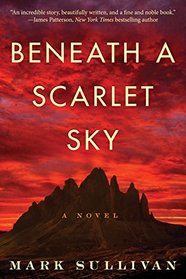* * * * Historical fiction. Based on a true story. During World War II, when the Germans invade Italy, a young Italian teenager is forced by his parents to flee their country in order to save him. However, even from far away, he still somehow gets involved in the war against Germany.
Gripping story, at times heartbreaking.
There were one or two scenes that could have been shorter but overall an excellent book.
This novel gives readers a view of WWII in Italy from a man who lived through it. A true story, Peno Lella's tale begins as a teenager living under Mussolini's rule. Then the Nazis arrived. The author dwells on the this period.
At 17, Peno is sent to Father Re, a Catholic priest at Casa Alpino boys camp. The good father trains him to guide people through the mountains to the safely of Switzerland. At 18, his family asks him to return to Milan where at their urging he becomes a driver for a Nazi general and works as a spy for the resistance. He can tell no one about his spying thereby engendering the hate of many Italians including his best friend. Pino shares the horrors he sees and his hate for the general and the Nazi atrocities. Deportations, murders, forced slavery and thefts are committed again and again by the Nazis leaving Italians starving.
The author spent years with Pino Lella who had not spoken about the war and was reluctant to do so. Peno was 79 when interviews began. So many documents were destroyed when the Nazis left that the author calls the novel biographical and historical fiction. Events from the story are based on Pino's experiences that others verified. The author paints a lifelike portrait of General Leyers who asked Pino if he hated him. As another reviewer reported âLeyers said âyes, you do...it would be surprising if you didn't hate me for what I've had to do today. A part of me hates myself...So here in Italy, and in your eyes, I'm a criminal. Back home, I'll be an unsung hero. Good. Evil. It's all a matter of perspective, is it not?â'
We don't know much about WWII in Italy because not much was written. Now the author describes through Pino's eyes what happened and how the Italians felt. Focusing on his youth, dreams, and ambitions he builds a credible picture of a young man caught in circumstances far beyond his actual age. Others in the story are equally realistic. This a fine read about this era told in a fascinating way.




